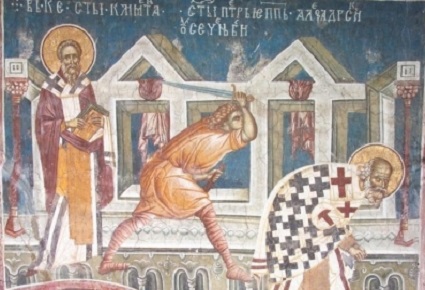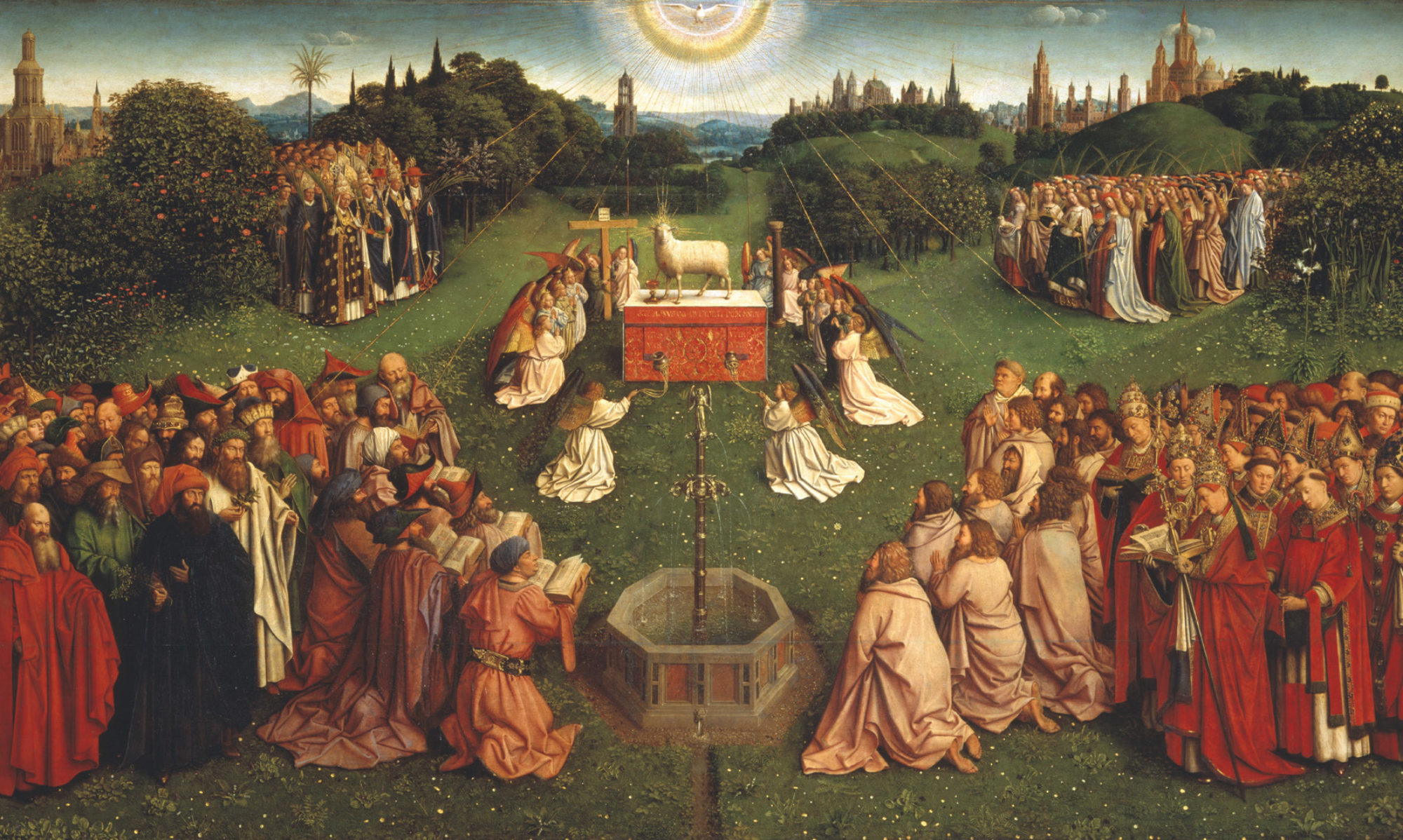Today it is taken for granted that the Church must find allies wherever it can in the fight against secularism. As an example of this view, we can cite author William Cinfici, who in his commentary on Chesterton’s Lepanto, says, “While Catholics and Protestants are finding themselves as allies trying to stem the degeneration of the West against a new Muslim aggression, they may ultimately have to forge and alliance with the Muslim world against the degeneration of the West” (1). Similar views have been expressed by Peter Kreeft, George Weigel, and other luminaries of the modern “evangelical Catholic” wing. According to this school of thought, it is possible to have a real and meaningful communion or alliance with non-Catholics when combating the “bigger problems” of modernity.
This approach, however, has little in common with the practice of the Early Church, who understood that the only real “problem” faced by any person or society is that of being out of communion with Christ and the Church. If one is in communion with Christ and the Catholic Church, all other problems can be overcome with, in and through the Faith; if one is not in communion with Christ and the Church, then this is the fundamental problem that needs to be addressed. The Fathers could not conceive of a problem or issue larger than that of being out of communion with the Church which merited any sort of alliance with non-Catholics or heretics. As an example of this mentality, we will look at the tale of St. Peter of Alexandria and his behavior toward the schismatic Meletius of Lycopolis during the Great Persecution of Diocletian.
Meletius and the Problem of the Lapsi
During the persecution of Diocletian (303-313), debate raged among Christian clergy concerning the treatment of the lapsi, those Christians who had buckled and sacrificed under the pressure of the persecution, but later sought readmittance to the Church. This controversy had rocked the churches of North Africa during the Decian persecution fifty years earlier, resulting in a brief schism and the election of the rigorist anti-pope Novatian, who argued that the Church had no power to reconcile those who had lapsed under persecution. The controversy was much greater in the first decade of the fourth century, as the Diocletianic persecution was vastly more severe and long lasting than that of Decius. Most of the Church followed the counsels laid down by St. Cyprian a generation earlier, that the lapsi could be readmitted after performing sufficient penance, to be judged solely by the local ordinary.
But as thousands of Christians lapsed during the persecution of Diocletian, an African bishop, Meletius of Lycopolis, began to resurrect the teaching of the Novatianists, refusing communion to the lapsi, even after they had been reconciled by their bishops and formally readmitted to the Church. Meletius won a small following of twenty-eight bishops who called themselves “The Church of the Martyrs.” Meletius’ rigorist teachings divided the Egyptian Church throughout the period of the persecution.
Meletius’ superior and great opponent was the Patriarch of Alexandria, St. Peter of Alexandria. Peter vehemently opposed the teaching of Meletius, counseling a more moderate approach in dealing with the lapsi, St. Peter’s approach was in continuity with the discipline laid down by St. Cyprian, Pope Cornelius, and others a generation earlier.
The Mutual Imprisonment of St. Peter and Meletius
But we are not so much interested here in the details of the schism or of the persecution, but rather in what the behavior of St. Peter of Alexandria during his subsequent imprisonment tells us about how the Early Church viewed the concept of communion.
In 305, during the height of the persecution, the imperial authorities in Alexandria arrested St. Peter and threw him into prison along with several of his priests and deacons. The schismatic Meletius was also arrested and imprisoned with several of his followers, the pagans of course making no distinction between orthodox Catholics and schismatic sects. Thus saint and heretic found themselves in the same prison, and by twist of providence, confined in the very same cell.
Given the Catholic Chuch’s modern approach of finding allies wherever it can, of making alliances based on subsidiarity concerns other than the Faith (world peace, human dignity, morality, etc), we would expect St. Peter and Meletius to bury their differences and unite as two brothers in Christ against a common pagan aggressor. To the modern mind, it would seem that as the communion between Peter and Meletius, two Christians and two bishops, was greater than their differnces. We would assume that they would have formed a natural affinity or alliance in their mutual state of imprisonment for the same faith against the pagan persecutos, who made no distinction between different types of Christians.
Such was not the case. We are told by St. Epiphanius in his Panarion that, when St. Peter found himself imprisoned with the famous heretic, he tried with impassioned zeal to win Meletius back to the Church’s discipline—even in prison, even on the cusp of execution! But Meletius and his followers would not renounce their heresy. St. Peter, therefore, sought to separate himself from the author of schism. Epiphanius says, “Filled as they were with excessive religious zeal, he [Peter] made a curtain down the middle of their cell by hanging up a cloak, a blanket, and a shirt, and declared through a deacon, ‘There are some who are of my view, let them come over on my side, and those of Meletius’ view, stay with Meletius.'” (2) After this, the two parties went on with their imprisonment and their daily prayers throughout the term of their imprisonment, rigidly ignoring each others’ existence on the other side of the curtain. St. Peter would eventually be beheaded without having ever reconciled Meletius nor Meletius repenting of his errors.

The Only Communion That Matters
The behavior of St. Peter might seem inflexibly rigid to those modern Catholics who propose an alliance with Islam against secularism, or prayer in common with pagans for world peace, or worship in common with Jews and Protestants, or venerating marytrs from other Christian confessions. “After all,” they say, “what unites us is greater than what divides us.” What is absent from this approach, however, is the understanding that what makes us one is the communion with God in the Spirit that comes only through being incorporated into the Body of Christ, the Church. This is the only communion that matters; in fact, it is the only communion there is. If one is not part of this communion, there is no real communion; there is only the City of God and the City of Man. While the members of both cities interpenetrate each other on this earth, ultimately one is either a member of one or the other. St. Peter could not have communion with Meletius simply because Meletius had broken communion. The only thing that could serve as the basis for the restoration of communion was renunciation of his Novatianist errors.
St. Peter understood how serious a thing it is to be out of communion with the Church; the spiritual barrier between himself and Meletius was perfectly signified by the physical barrier he erected in his cell. St. Peter could not consider that the two could have some sort of imperfect or partial communion based on anything other than a shared faith. The chasm formed by schism was greater than the common experience of martyrdom.
“What concord hath Christ with Belial? Or what part hath the faithful with the unbeliever?” (2 Cor. 6:15)
NOTES
(1) G.K. Chesterton, Lepanto (Ignatius Press: San Francisco, 2004), 75
(2) St. Epiphanius, Panarion, Book II, 68.3.3
Phillip Campbell, “No Communion in Martyrdom: St. Peter & Meletius,” Unam Sanctam Catholicam, January 19, 2014. Available online at https://unamsanctamcatholicam.com/2023/07/st-peter-of-alexandria-and-meletius
